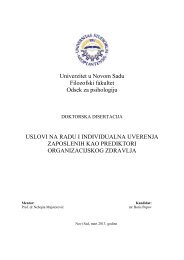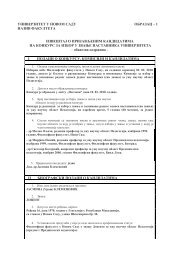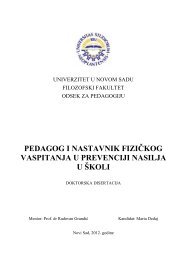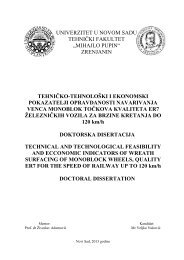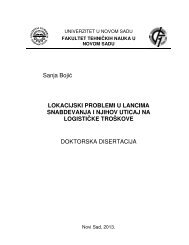Intercultural competence as an aspect of the communicative ...
Intercultural competence as an aspect of the communicative ...
Intercultural competence as an aspect of the communicative ...
Create successful ePaper yourself
Turn your PDF publications into a flip-book with our unique Google optimized e-Paper software.
2.3.6. Criticism against <strong>the</strong> intercultural elements in <strong>the</strong> cl<strong>as</strong>sroom<br />
Just <strong>as</strong> <strong>the</strong>re are differences <strong>of</strong> opinion about <strong>the</strong> definition <strong>of</strong> ICC, <strong>the</strong>re are<br />
confronted views on its import<strong>an</strong>ce. The b<strong>as</strong>is for <strong>the</strong>se differences is <strong>the</strong> complex nature<br />
<strong>of</strong> <strong>the</strong> concept with <strong>the</strong> criticism mostly directed at ICC’s ‘bulkiness’ <strong>an</strong>d unwieldiness<br />
for <strong>the</strong> cl<strong>as</strong>sroom.<br />
From a sociological point <strong>an</strong>d a point <strong>of</strong> cultural determinism, it could be<br />
purported that learners c<strong>an</strong>not underst<strong>an</strong>d <strong>an</strong>y o<strong>the</strong>r culture except <strong>the</strong>ir own. Even if<br />
learners show a genuine wish to underst<strong>an</strong>d <strong>an</strong>o<strong>the</strong>r culture, <strong>the</strong>y would not be able to<br />
because <strong>the</strong>y would <strong>an</strong>alyse <strong>an</strong>d define <strong>the</strong> target culture issues <strong>an</strong>d concepts against <strong>the</strong>ir<br />
own cultural patterns. Lyotard sees comparison between two cultures <strong>as</strong> <strong>an</strong> act <strong>of</strong> violence<br />
because ‘a universal rule <strong>of</strong> judgement between genres [<strong>an</strong>d cultures, by <strong>the</strong> same token]<br />
is lacking in general’ (Lyotard 1988: xi <strong>as</strong> cited in Bredella 2003: 231). Also, <strong>as</strong> Fish<br />
(1997) says, we c<strong>an</strong> claim to underst<strong>an</strong>d a foreign culture if we approve <strong>of</strong> what we<br />
underst<strong>an</strong>d. However, underst<strong>an</strong>ding <strong>an</strong>d approving are two distinct processes.<br />
Fur<strong>the</strong>r, this radical relativism would lead to <strong>the</strong> situation in which we would not<br />
be able to criticise bad practices in a particular culture, we would be forced ‘to tolerate<br />
<strong>the</strong> intolerable’ (Bredella 2003: 232). Ano<strong>the</strong>r <strong>as</strong>sumption <strong>of</strong> radical relativism is that it is<br />
b<strong>as</strong>ed on a concept <strong>of</strong> culture <strong>as</strong> a closed homogeneous system that determines <strong>an</strong><br />
individual’s behaviour. However, people sometimes do not follow <strong>the</strong>se rules <strong>an</strong>d act<br />
differently, <strong>an</strong>d radical relativism would not be able to account for inst<strong>an</strong>ces <strong>of</strong> such<br />
behaviour.<br />
Ano<strong>the</strong>r criticism comes from those who see intercultural underst<strong>an</strong>ding in <strong>the</strong><br />
light <strong>of</strong> ab<strong>an</strong>doning one’s culture 17 (Harden, Witte 2000). However, underst<strong>an</strong>ding <strong>an</strong>d<br />
empathy that one c<strong>an</strong> show are not connected to <strong>the</strong> loss <strong>of</strong> one’s own identity. McCarthy<br />
believes that we c<strong>an</strong> develop ‘a third position’ <strong>as</strong> a result <strong>of</strong> <strong>the</strong> interaction with o<strong>the</strong>r<br />
cultures, that is, while not one culture holds <strong>the</strong> point <strong>of</strong> view that is absolute, learning<br />
from experience c<strong>an</strong> bring us closer (McCarthy 1989).<br />
There have also been voices against intercultural learning <strong>as</strong> a superfluous <strong>as</strong>pect<br />
<strong>of</strong> l<strong>an</strong>guage learning, a st<strong>an</strong>d taken by Edmondson <strong>an</strong>d House (2000) (in O’Dowd 2004).<br />
B<strong>as</strong>ing <strong>the</strong>ir claims on <strong>the</strong> research conducted by Oller <strong>an</strong>d Perkins (1978) which found<br />
no correlation between <strong>the</strong> affective domain <strong>an</strong>d <strong>the</strong> cognitive <strong>an</strong>d skills domain, that is,<br />
17 Some scholars have gone even fur<strong>the</strong>r claiming that <strong>the</strong> cultural <strong>as</strong>pects taken into consideration are<br />
solely those <strong>of</strong> <strong>the</strong> target culture, thus ignoring <strong>the</strong> learner’s culture (Alptekin 2002).<br />
64






